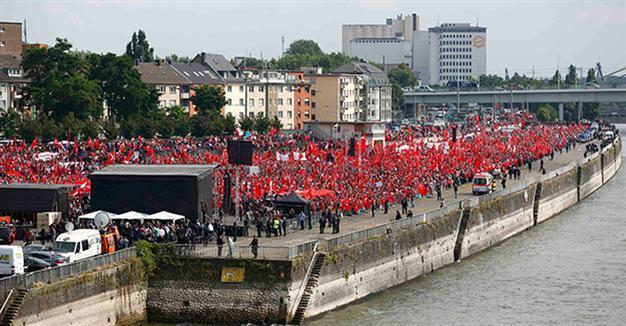Ankara: Berlin’s ban on Erdoğan’s videoconference at Cologne rally unacceptable
Emine Kart - ANKARA

REUTERS photo
Having strongly verbalized its “disappointment and reaction,” Turkey’s Foreign Affairs Ministry has labeled its ally Germany’s ban on President Recep Tayyip Erdoğan’s participation via videoconference at a rally in Cologne as “unacceptable.”
The chargé d’affaires at the German Embassy in Ankara was summoned to the Foreign Ministry on Aug. 1 over the ban on Erdoğan’s participation in the rally in Cologne.
The chargé d’affaires met a relevant diplomat at the Foreign Ministry headquarters, a deputy director-general, in the afternoon hours, diplomatic sources at the Foreign Ministry said.
“During the meeting, the Turkish side underlined that the activity in Cologne was carried out peacefully and aimed at defending democracy and freedoms,” the same sources told the Hürriyet Daily News.
The Foreign Ministry also put emphasis on the fact that the activity in Cologne was “an inclusive one which was supported by civil society organizations from different political views.”
“The Turkish side strongly expressed Ankara’s disappointment and reaction over the obstruction of an elected president’s address via videoconference at such an inclusive demonstration,” the diplomatic sources, speaking under customary condition of anonymity, also said.
“Ankara has emphasized that this approach that has been displayed by the offices of an ally of ours, which takes democracy and the rule of law as a basis, is unacceptable,” the sources added, while stressing that “democracy and the rule of law are common values” for Turkey and its ally Germany.
The Turkish community in Cologne was set to hold a massive rally to protest the July 15 failed coup attempt with the participation of representatives of different political parties and non-governmental organizations.
Erdoğan wanted to address the participants via video but was rejected by the local authorities and the German Constitutional Court due to security concerns.
Presidential Spokesperson İbrahim Kalın called the ban “unacceptable,” saying it was in violation of freedom of expression.
